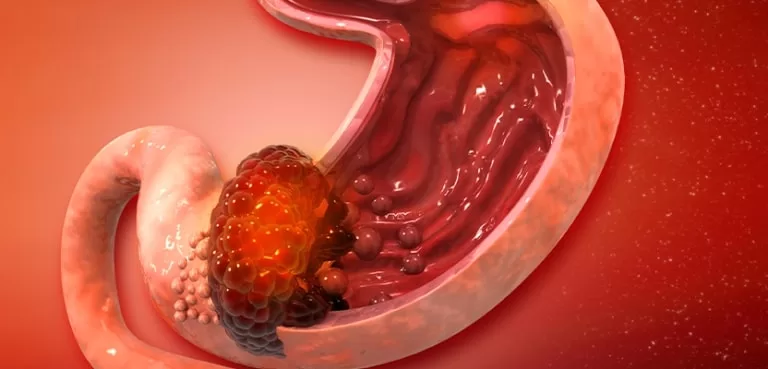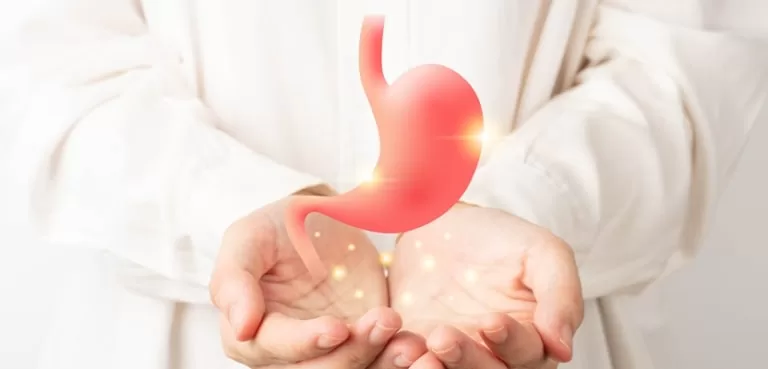+90 533 813 89 77
info@bookingforhealth.com
What are the Functions of the Stomach ?
The stomach has several important functions in the digestive process.
- Mixing and Grinding Food: The stomach muscles mix the food with stomach acid and digestive enzymes, breaking it down into a thick liquid called chyme.
- Secreting Acid and Enzymes: The stomach lining secretes hydrochloric acid and enzymes, such as pepsin, that help to break down food further.
- Delaying Emptying Into the Small Intestine: The stomach releases chyme into the small intestine in small amounts, allowing for efficient digestion and absorption of nutrients.
- Absorbing Some Medicaments and Alcohol: Some medicaments and alcohol can be absorbed directly into the bloodstream from the stomach.
- Storing Food: The stomach also acts as a temporary storage area for food before it is moved on to the small intestine for further digestion.

What are the Causes and Symptoms of Stomach Cancer?
Stomach cancer, also known as stomach cancer, is a type of cancer that develops in the lining of the stomach. There are several factors known to increase the risk of developing stomach cancer.
The risk of stomach cancer increases with age, with most cases occurring in people over the age of 60. Men are more likely to develop stomach cancer than women. A diet high in smoked, salted, or pickled foods and low in fruits and vegetables has been linked to an increased risk of stomach cancer. H. pylori bacteria are found in the stomach of about half of the world’s population, however, it is not clear if this is direct cause of stomach cancer. Smoking has been linked to an increased risk of stomach cancer, possibly because it damages the DNA in the stomach lining.
Symptoms of stomach cancer include; there is loss of appetite, sudden weight loss, abdominal pain, nausea and vomiting, fatigue, bloating or discomfort felt after meals, bloody stools or vomit, heartburn, and indigestion. It’s worth noting that these symptoms can also be caused by other, less serious conditions, and stomach cancer may not have any noticeable symptoms in its early stages. So it’s important to see a doctor if you have any concerns.

What are the Treatment Options for Stomach Cancer?
Treatment options for stomach cancer can include surgery, radiation therapy, and chemotherapy, either alone or in combination.
Surgery is the most common treatment for stomach cancer, and the type of surgery can vary depending on the location and stage of the cancer. In some cases, part of the stomach may be removed, while in more advanced cases, the entire stomach may need to be removed.
Radiation therapy using high-energy radiation to kill cancer cells may be preferred. This form of treatment may be preferred before or after surgery to shrink a tumor and facilitate its removal.
Chemotherapy is a form of treatment to kill cancer cells. It is often used in conjunction with surgery or radiation therapy to increase the chances of treatment. In advanced cases, chemotherapy can also be used to relieve symptoms.
Targeted therapy uses medicaments that target specific molecules or proteins in cancer cells. These medicaments can be used alone or in combination with chemotherapy to treat stomach cancer.
The choice of treatment depends on several factors, such as the stage and degree of the tumor, the patient’s overall health, and the patient’s personal preferences. It is necessary to consult an oncologist to determine the best treatment plan.
What is the Recovery Process After Stomach Cancer Treatment?
The recovery process after stomach cancer treatment can vary depending on the type of treatment that was received and the patient’s overall health. Generally, however, it can take several weeks or months to fully recover and regain strength and energy.
After surgery, patients typically stay in the hospital for several days to a week, during which time they may be on a liquid diet before progressing to a more solid diet as they recover.
Radiation therapy and chemotherapy can cause fatigue and other side effects, and recovery from these treatments can also take several weeks or months. It’s important for patients to rest as much as possible and to follow their healthcare provider’s recommendations for managing side effects.
For patients who had part of their stomach removed, it’s important to adjust their diet and eating habits. A dietitian can help patients plan their meals, including the right amount of protein and calories needed for recovery.
Many patients may experience changes in their digestion and bowel function after treatment. Drinking water, eating high-fiber foods, and being physically active can help to improve bowel function.